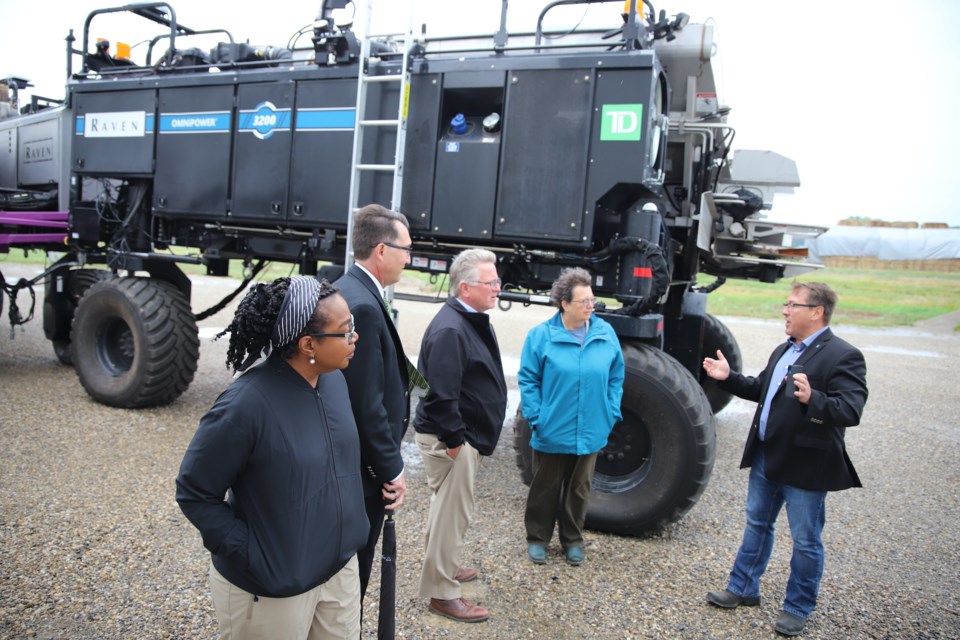OLDS — Three members of the Senate Standing committee on agriculture and forestry toured the Olds College of Agriculture & Technology on Aug. 31 to gather facts for a report the committee is preparing on soil health.
A fourth senator, also on the tour in Alberta, was unable to attend the visit to Olds College.
Earlier in the week, the senators toured research centres and farms in other areas of Alberta. And before that, they were in Saskatchewan.
The committee’s report is expected to be released next spring, exactly 40 years after the first Senate report on soil health was released by a committee headed by former Saskatchewan senator Herb Sparrow.
“That first report is the most requested Senate study report ever in the history of the Senate of Canada,” committee chair Rob Black of Ontario said during an interview with the Albertan.
The three senators delved especially into the college’s Smart Farm technology and how that relates to soil health.
“The smart technology is very relevant to soil health, because it gives farmers a whole panoply of techniques and technologies that they can use to make sure that their soil is healthy, and that they can measure to validate that their soil is healthy," deputy committee chair Paula Simons of Alberta said.
Sen. Sharon Burey of Ontario noted that before becoming a senator, she was a physician. So, she’s been looking at soil health from that perspective as well.
“There are so many cool things happening in agriculture, science, and the Smart Farms are a way for kids to become engaged,” Burey said. “I want to amplify that I think that's very, very important for the next generation and for soil health.”
Black and Simons stressed that although report is being prepared for the federal government, their goal is to write it in such a way that it can be read by ordinary citizens, because they say soil health is key to economic and physical health in Canada.
“We want to make sure that we present a report that is accessible to the general reader, because everybody in this country has a stake in our soil health,” Simons said.
“Because if we would like to eat in the future, there's only a limited amount of topsoil. We can't fritter it away. We can't let it blow away, we can't let it be paved over. We need to safeguard the soil that we have. And that is going to take a collective effort.”
Black noted that as part of its study, the committee has travelled across Canada and heard from nearly 100 witnesses, including scientists. He anticipates they’ll hear from more before the report is completed.
The senators were asked why a second soil health study needed to be done, given one had already been done in 1984.
They said things have changed a lot since then, citing climate change and food insecurity; issues that weren’t talked about so much or so present back then.
Simons said one of the things that has impressed her is to learn that prairie grasslands do a great job of sequestering carbon all by themselves, if given the chance.
Simons said as an Albertan, she was anxious to bring her fellow senators to the Prairies so they could see firsthand that the way people farm and ranch on the Prairies and how the soil conditions they face are different than producers in Central or Eastern Canada face.
For one thing, she said, the amount of land involved can be huge.
“We visited a ranch yesterday where they’re ranching on 7,000 acres of native prairie grassland,” Simons said. “I mean, that’s the scale. It’s very difficult for somebody from central Canada to wrap their heads around.”
She noted that in Saskatchewan, the senators found out that soil salinity is a big problem “in a way that it isn’t in other parts of the country.”
Simons was also impressed with by the fact that many Albertan producers they spoke with agree that climate change is a big issue and factor in soil health and has to be dealt with.
“I think the time for debating whether climate change is happening, that train has left the station,” she said.
“I mean, climate change isn’t something that’s going to happen in the future; it’s something that’s happening right here and now.
“And I think what’s been inspiring to me is to see how many farmers and ranchers don’t just sort of grudgingly accept that, but have enlisted themselves in ways to fight climate change through the right kind of grazing techniques, through the right kind of planting techniques.
“Because they understand that healthy soil and healthy plants are really essential to sequestering carbon. We talk all the time about planting trees. Well, that natural prairie grassland is a brilliant carbon sink.
“And you know, the trick is to not rip it up, but to make sure that we preserve it intact, so that it goes on doing what it’s supposed to do.”
Olds College president Ben Cecil helped facilitate the tour.
He was impressed with the senators’ interest in the contribution the college can make to soil health through its smart technology.
“They’ve been asking incredibly probative questions, really trying to understand the details and the nuances (of) Canadian ag,” he said.
“They’ve been talking about soil science and soil health, the stewardship of the land, maintaining the viability of the Canadian farm and Canadian agriculture through maintaining a healthy soil environment.
“They’ve been talking about, how do we best support our producers? What is the entire ecosystem around the producer that we need to put in place as government?
“I don’t think I’ve ever seen from an organization or a group of individuals this level of commitment for something that is so important to our nation’s future – and that’s our ability to feed the world and ourselves.”



